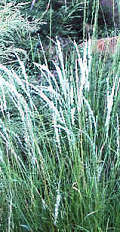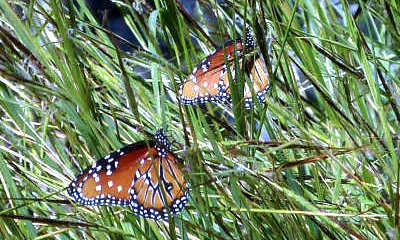Ornamental and Exotic Grasses
FOOD PLANTS
Culinary Herbs
Fruit, Berries, Nuts
Peppers, Chilies
Strawberries
Tomatoes
Vegetable Calendar Zone 9
ORNAMENTALS
Grasses
Ground Cover
Perennials
Shrubs
Succulents
Trees and Palms
Vines
SPECIALTY GARDENS
Butterfly Garden
Erosion Control
Fragrance Garden
Hedges, Barriers, Screens
Hummingbird Garden
Long Blooming
Winter-Blooming
GARDENING TIPS
Dealing with Critters
Digging Holes for Plants
Fruit: Selection, Cultivation
Garden Bed: Sterilizing
Landscaping
Microclimates
Parasitic Plants
Plant Placement
Selecting Plants
Soil Prep for Vegetables
USDA Hardiness Zones
Planting, Watering, Shrubs, Trees
NURSERIES / SUPPLIES
Online
Phoenix
Tucson
MEETINGS
Phoenix Meetings
Tucson Meetings
Overview

See Ground Cover for plants that can substitute for lawn grass.
All of the grasses listed below are warm-season, dry-soil grasses. Cool season grasses are inappropriate for most desert regions because they need spring rains, often moist soil, and may go dormant during summer heat. Except as noted, the grasses below are perennial, are bunch grasses rather than turf-forming, and require full sun.
Grass plants reproduce both sexually with seeds and asexually using stolons and/or rhizomes. Stolons are specialized stems that run horizontally above ground. Rhizomes are stems that run horizontally underground. Both form nodes at intervals which produce roots and new shoots. The new shoots are clones of the original plant.
Most, but not all, grasses will tiller if mowed when they grow above 3" (7.5cm) in height. Tillering is the production of new shoots, often from the edges of the clump. In the southwest desert it is best to mow at a 4" (10cm) height so that shoots will shade the soil and keep roots cool. A mulching lawn mower will drop its cuttings on the ground which helps insulate the soil to prevent heating and moisture loss.
Ornamental Grasses
Bouteloua curtipendula - Side Oats Grama
Grows 1-3' (30-90cm) tall. Medium-width, gray-green leaves.
Purplish flowers on one side of stalk bloom in summer.
Can be turf-forming under ideal conditions.
Native to North America.
Water once a month. Will not tolerate grazing or mowing;
mow when dormant.
Bouteloua gracilis - Blue Grama
Grows 1-1.5' (30-45cm) tall. Narrow, gray-green leaves.
Reddish-purple flowers bloom in summer and produce flagged
seed heads. Native to North America.
Water once a month. Do not mow during the first year until
dormant to strengthen roots.
Does not tolerate foot traffic.
Digitaria californica - Arizona Cottontop
Grows 1-4' (30-120cm) tall. Medium-width, blue-green leaves.
Cottony seed heads appear mid summer to fall.
Native to Arizona through Texas, Colorado, Oklahoma and Mexico.
Thrives in well-drained soil. Needs only rain, but water
once a month in drought for more robust growth.
Annual; should not be grazed or mown until seed heads drop.
Heteropogon contortus - Tanglehead
Grows 1-2.5' (30-75cm) tall. Narrow, green, slightly fragrant leaves.
Stems, arched or straight, form an attractive round grass clump.
Tiny, unshowy flowers bloom summer through fall. The plants develop
black seeds with a single long awn a sharp spike at opposite ends.
The awn twists as it alternates between dry and wet, and can drill
the seed into soil and even injure animals if it gets caught in
their fur. This widespread, tropical, African and Asian grass is
naturalized from California to Texas and Florida.
Butterflies are attracted to this plant when it flowers in the fall.
Muhlenbergia capillaris - Regal MistTM
Rapidly grows 3-4' (90-120cm) tall. Narrow, glossy green leaves.
Pinkish-red flowers, looking spectacular in front of a setting sun, bloom in fall.
Native to Eastern United States and Gulf coast.
Water every two weeks. Reseeds only in damp soil.
Shear dead leaves and spent flowers in early spring.
Muhlenbergia dumosa - Bamboo Muhly
Rapidly grows to 6' (1.8m) tall. Spreads slowly with
rhizomes to a 5' (1.5m) wide clump. Bright yellow-green, fern-like
leaves have a miniature bamboo look. Insignificant flowers.
Native to Arizona and Mexico.
Best appearance if watered every two weeks.
Muhlenbergia emersleyi 'El Toro' - Bullgrass
Grows 2-3' (60-90cm) tall.
Blue-green leaves are slightly wider than Deer Grass.
Dark purple flowers bloom in fall.
Parent species native to Arizona through Texas and Mexico.
Best appearance if watered every two weeks.
Full sun to part shade.
Muhlenbergia lindheimeri - Lindheimer's Muhly
Grows in a clump 1-2' (30-60cm) tall and 2-4' (60-120cm) wide.
Blue-gray arching leaves. Rosy flowers on flower stalks
up to 5' (1.5m) high bloom in fall and age to gray, persisting
into winter. Native to Texas, Mexico and Central America.
Water once a month.
Muhlenbergia rigens - Deer grass
A mounding grass that rapidly grows to 4' (120cm) tall and
wide. Narrow arching green-gray leaves. Purple to yellow
flowers, not showy, bloom in fall.
Native to California through Texas, Nevada and Mexico.
Best appearance if watered every two weeks. Reseeds in
damp soil.

Photo taken November 5 at noon, Tohono Chul Gardens, Tucson.
Schizachyrium scoparium - Little Bluestem
Grows 3' (90cm) tall. Narrow blue-green leaves turn
red or purple after frost. Some varieties have blue leaves.
Purplish or bronze flowers bloom late summer through fall.
Seeds, fuzzy white at tips, attract birds in winter.
Native to North America. Needs soil that dries quickly.
Full sun to part shade.
Sorghastrum nutans - Indian Grass
Grows 3-4' (90-120cm) tall. Blue-green medium width leaves.
Yellow to orange flowers bloom fall to winter.
Native to North America. Best if watered every two weeks.
Shade intolerant.
Sporobolus airoides - Alkali Sacaton
Grows 1-3' (30-90cm) tall. Medium-green, narrow leaves.
Rosy flower spikes bloom June through summer.
Used for soil reclamation projects.
Native to Western North America.
Water once a month. Needs well-drained soil.
Sporobolus wrightii - Big Sacaton
Grows 3-6' (90-180cm) tall. The cultivar, Giant Sacaton, grows
to 8' (2.4m) tall. Medium-green, narrow leaves. Yellow to reddish
flowers bloom in fall.
Native to Southwestern United States and Mexico.
Water once a month. Needs well-drained soil.
Turf Grasses
Bouteloua dactyloides - Buffalo Grass
A great plains native that grows 6-12" (15-30cm) tall.
Medium-green, narrow leaves. Turf-forming with stolons.
Deep roots provide excellent erosion control. Regrows after
a fire. Native to Central North America.
Takes extreme heat and drought, but goes dormant in prolonged
drought. Needs well-drained soil. Water once a month to root
depth.
Cynodon dactylon - Bermuda Grass
Grows 4-16" (10-40cm) tall. Gray-green, narrow leaves.
Insignificant flowers on palmate spikelets bloom summer to mid-fall, allowing propagation
by seed.
Turf-forming with rhizomes and stolons. Considered invasive.
Regrows after a fire. Grows dense under the pressure of
grazing and mowing.
It is the owner's obligation to mow this grass, possibly to a 2" (5cm) height, to prevent
flower and seed development that can lead to it escaping unchecked into the wild.
Native to Africa.
Deep roots give it the ability to withstand drought.
Excellent erosion control.
Appearance improves if watered more than once a month.
Exotic Grasses
Cortaderia selloana 'Pumila' - Dwarf Pampas Grass
Grows 4' (120cm) tall. Edges of leaves are saw-toothed, can
inflict a nasty cut. Showy white flowers on 6' stalks
bloom mid-summer and feathery seed heads persist into fall.
Native to South America. Does not reseed easily.
Roots compete with native plants for moisture and nutrients.
Phyllostachys aurea - Golden Bamboo
A running type bamboo that needs a barrier trench to prevent invasiveness.
Grows to 25' (7.6m) high.
Full sun. USDA hardiness zones 7-11.
Latest update: May, 2025
© 2008-2026 by GardenOracle.com

